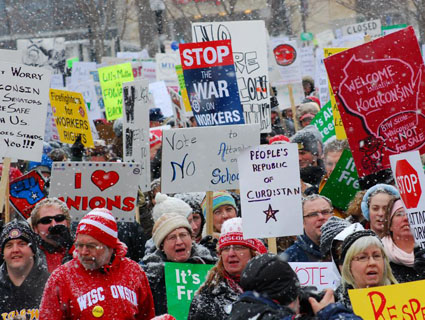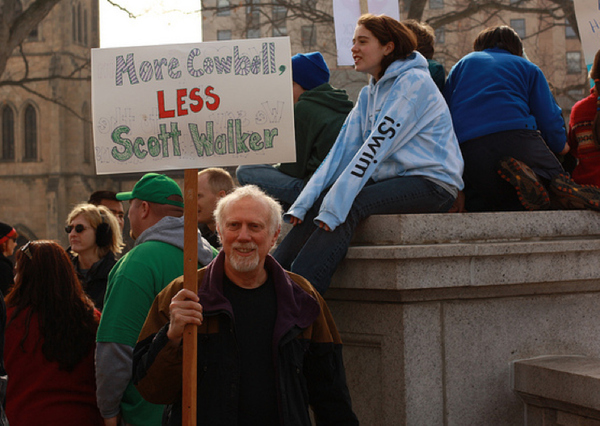MJ reporter Andy Kroll has been working on the ground in Madison, Wisconsin, with media colleagues from the Uptake to collect the latest on the ongoing labor dispute there. Just a few hours ago, Uptake’s Oliver Dykstra scored an interview in the capitol with Mahlon Mitchell, president of the Professional Firefighters of Wisconsin, who pledged solidarity with his fellow state workers, even though firefighters and police were spared from Gov. Scott Walker’s attempt to bust state unions’ bargaining power. Among Mitchell’s pledges: The state’s safety workers would agree to forgo some of their privileges and benefits to preserve collective bargaining for all the state’s union workers. “We have a unique job,” he said, “but so does the snow-plow driver, so does the janitor, so does a nurse, so does a teacher at UW college.
Full video is below. Highlights:
- “The reason that we are here is because it’s important that labor sticks together. There was a message from the governor’s office to conquer and divide…collective bargaining is not just for us, police and fire, it’s good for all involved. It’s a middle-class upbringing.”
- “When firefighters see an emergency, one thing we do is respond. And we see an emergency in the house of labor, so that’s why we’re here.”
- “Every day, if you notice, we lead the AFSCME employees, the SEIU employees, all the public sector employees into the building, because we are here to fight with them.”
- “Collective bargaining is not about union rights; it’s about rights of workers…We ask Gov. Walker to come back and negotiate with the people, negotiatie with the state workers’ unions, and get things worked out, as opposed to just putting out this bill and we don’t hear from him again.”
- “Us as firefighters, we have been exempted from this bill…There’s a 5.8 percent pay into the pension, there’s a 12.4 percent pay into the health care premium benefits…For the betterment of the government, for the betterment of the state, we don’t mind helping to pay for that. We don’t want to price ourselves out of a job. Ever. What we want to do is have a fair and equitable treatment among our members.”












